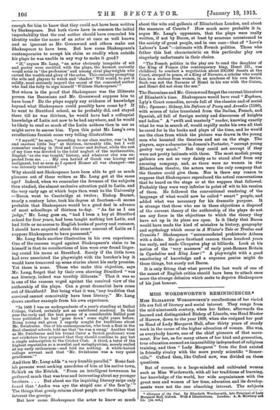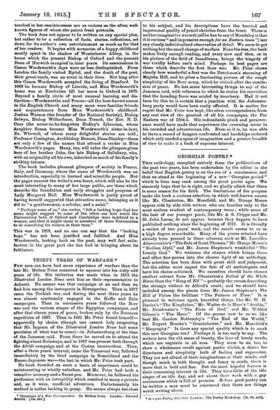MISS WORDSWORTH'S REMINISCENCES.*
Miss ELIZABETH WORDSWORTH'S recollections of her varied life are full of literary and social interest. They range from the mid-nineteenth century, when her father, afterwards the learned and distinguished Bishop of Lincoln, was Head Master of Harrow, down to the year 1909, when she resigned her post as Head of Lady Margaret Hall, after thirty years of steady work in the cause of the higher education of women. She was, as everybody knows, one of the chief pioneers of that movement. For her, as for many others of her kind and generation, true education seemed an impossibility independent of religious training, and thus "Lady Margaret" from the first existed in friendly rivalry with the more purely scientific " Somerville." Oxford then, like Oxford now, was divided on these questions.
But of course, to a large-minded and cultivated woman such as Miss Wordsworth, with all her traditions of learning, her knowledge of the world, her wide acquaintance with the great men and women of her time, education and its developments were not the one absorbing interest. The subjects touched in her reminiscences are as various as the often well known figures of whom she paints fresh portraits.
The book does not appear to be written on any special plan,
but rather to be a collection of facts, stories, reflections, set down for its author's own entertainment as much as for that
of her readers. It begins with memories of a happy childhood mostly spent in the shadow of Westminster Abbey, in the house which the present Bishop of Oxford and the present Dean of Norwich occupied in later years. Its associations in Canon Wordsworth's days were no less distinguished. From London the family visited Rydal, and the death of the poet, their great-uncle, was an event in their lives. Not long after this Canon Wordsworth accepted the living of Stanford. In 1869 he became Bishop of Lincoln, and Miss Wordsworth's home was at Riseholme till her move to Oxford in 1879. Beyond a family circle of most unusual learning and dis tinction—Wordsworths and Freres—all the best-known names in the English Church and many more were familiar friends and acquaintances from Miss Wordsworth's childhood.
Joshua Watson (the founder of the National Society), Bishop Selwyn, Bishop Wilberforce, Dean Trench, the Rev. H. D.
Ooze (the never-to-be-forgotten Bodley's Librarian, whose daughter Susan became Miss Wordsworth's sister-in-law), Dr. Whewell, of whom many delightful stories are told ; Professor Conington, Archbishop Benson, Dean Stanley—these are only a few of the names that attract a reader in Miss Wordsworth's pages. Many, too, will value the glimpses given here of her brother John, the late Bishop of Salisbury, who, with an originality all his own, inherited so much of his family's striking talents.
The book includes pleasant glimpses of society in France, Italy, and Germany, where the name of Wordsworth was an introduction, especially to learned and scientific people. But the pages nearest the writer's own heart, which will also be the most interesting to many of her large public, are those which describe the foundation and early struggles and progress of Lady Margaret Hall. Miss Wordsworth is justly proud of having herself suggested that attractive name, belonging as it did to "a gentlewoman, a scholar, and a saint."
"Perhaps some of us," she writes, "felt a lurking hope that her name might suggest to some of the other sex how much the Universities both of Oxford and Cambridge were indebted to a woman, and that it might occur to members of those Universities to do something for women in their turn."
This was in 1878, and no one can say that the "lurking hope" has not been justified and fulfilled. And Miss Wordsworth, looking back on the past, may well feel satisfaction in the great part she has had in bringing about its fulfilment.







































 Previous page
Previous page